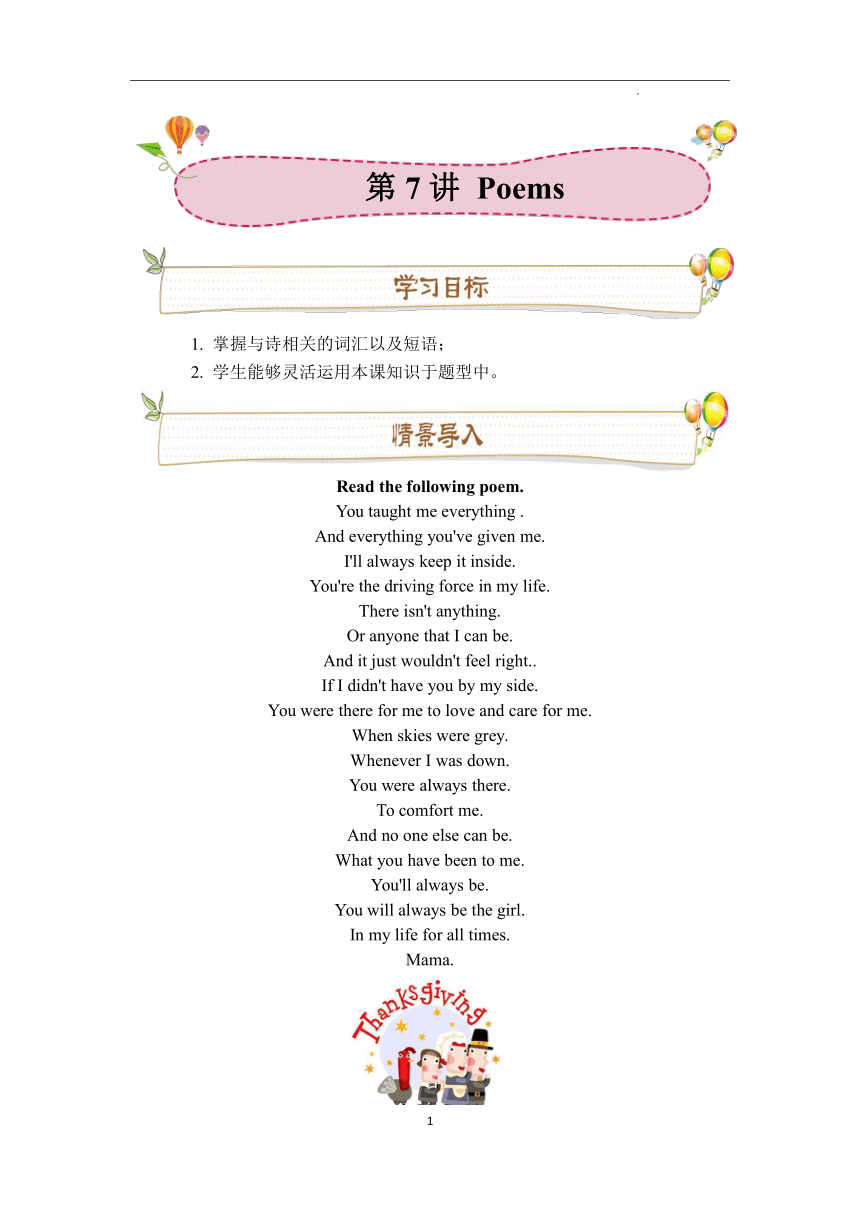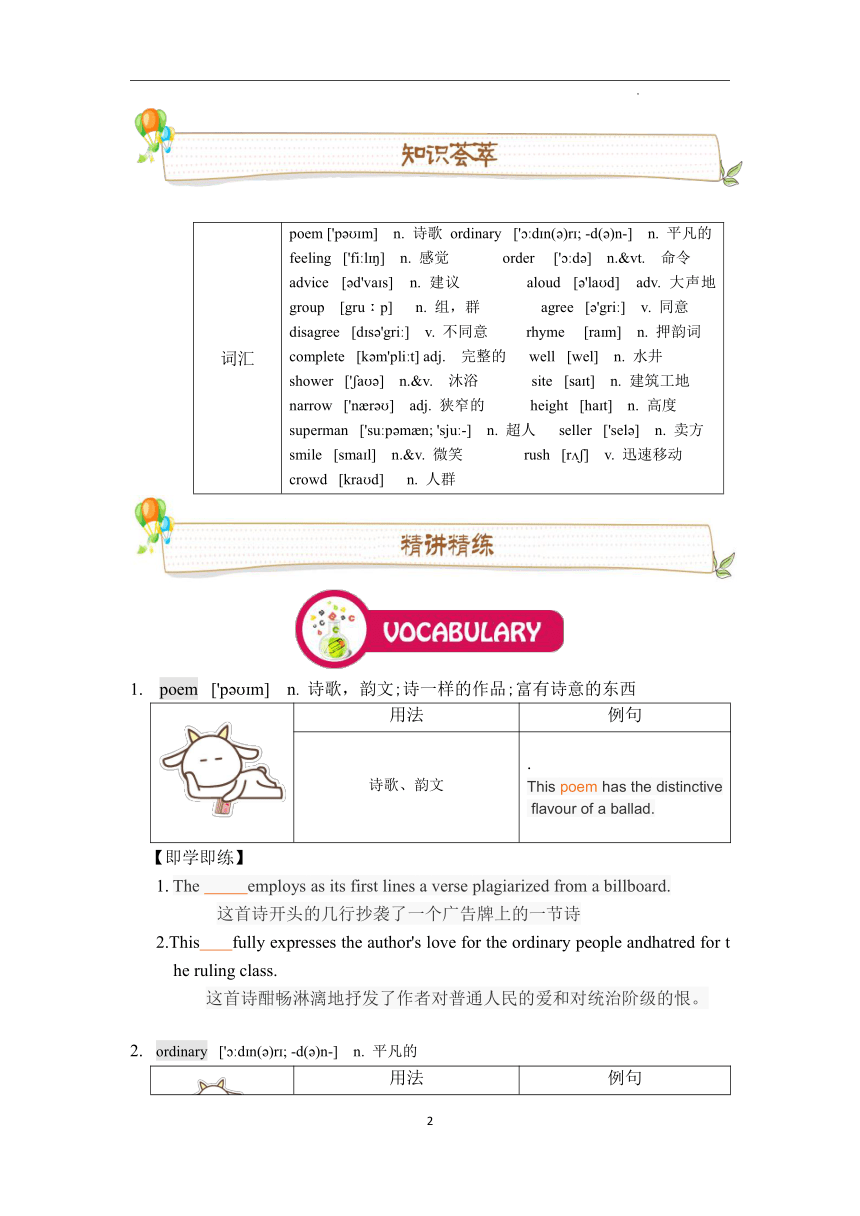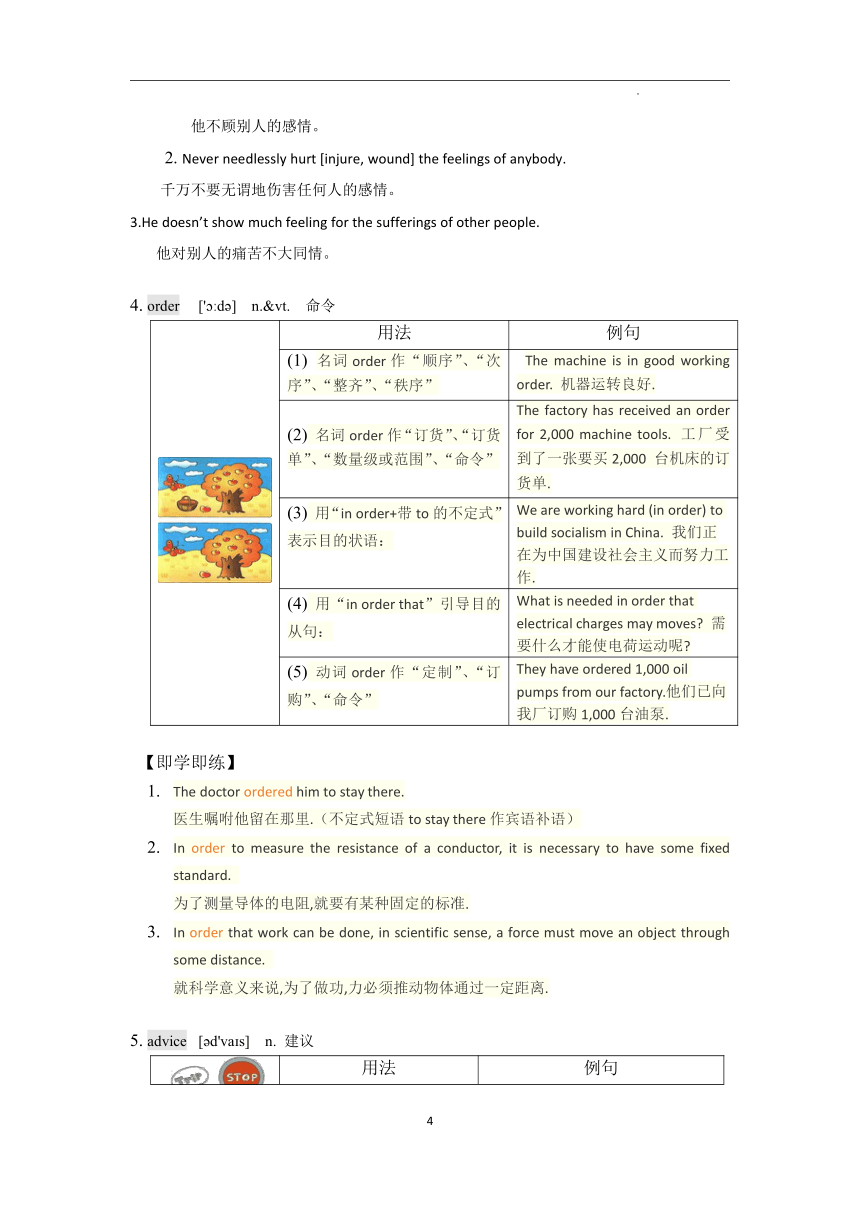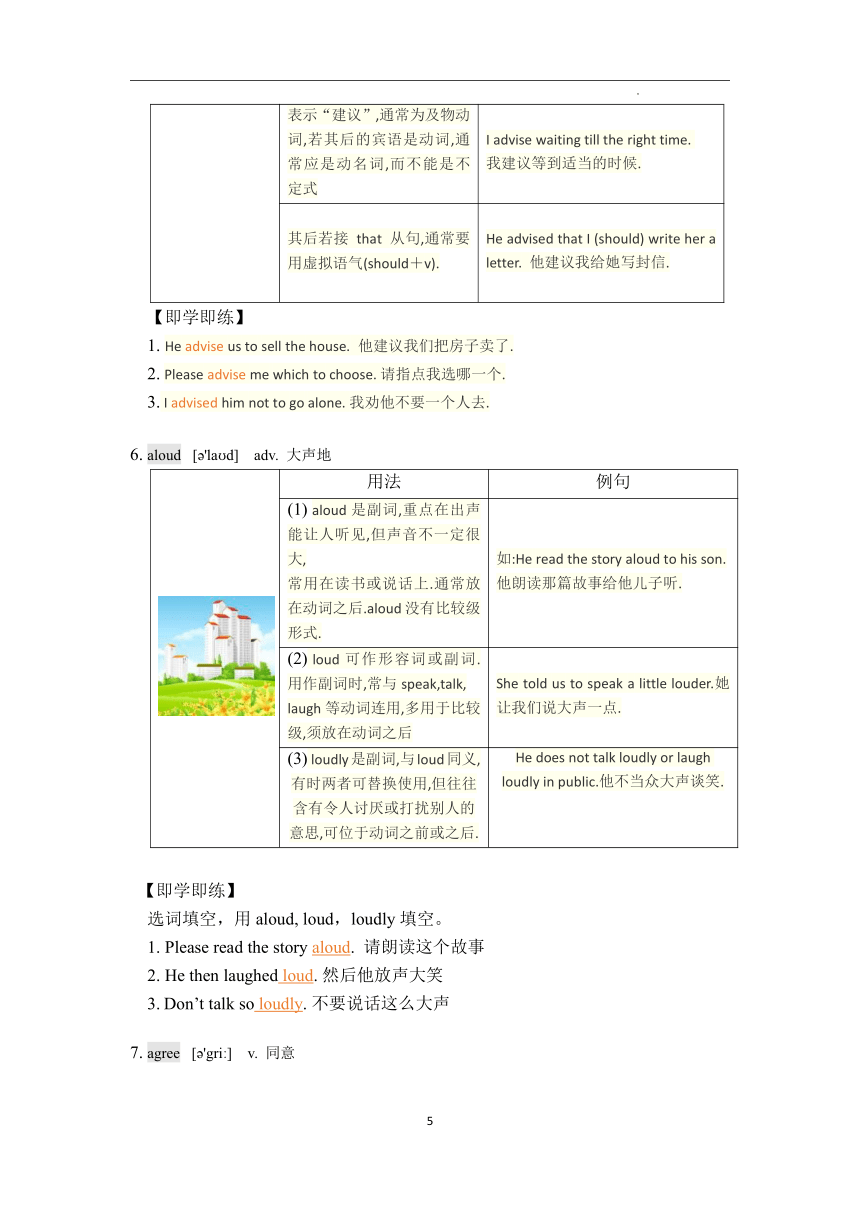Unit 7 Poems 词汇篇-- 同步讲义学案
文档属性
| 名称 | Unit 7 Poems 词汇篇-- 同步讲义学案 |  | |
| 格式 | doc | ||
| 文件大小 | 800.2KB | ||
| 资源类型 | 教案 | ||
| 版本资源 | 牛津深圳版 | ||
| 科目 | 英语 | ||
| 更新时间 | 2022-04-14 07:06:07 | ||
图片预览





文档简介
1. 掌握与诗相关的词汇以及短语;
2. 学生能够灵活运用本课知识于题型中。
Read the following poem.
You taught me everything .
And everything you've given me.
I'll always keep it inside.
You're the driving force in my life.
There isn't anything.
Or anyone that I can be.
And it just wouldn't feel right..
If I didn't have you by my side.
You were there for me to love and care for me.
When skies were grey.
Whenever I was down.
You were always there.
To comfort me.
And no one else can be.
What you have been to me.
You'll always be.
You will always be the girl.
In my life for all times.
Mama.
词汇 poem ['p m] n. 诗歌 ordinary [' d n( )r ; -d( )n-] n. 平凡的 feeling ['fi l ] n. 感觉 order [' d ] n.&vt. 命令 advice [ d'va s] n. 建议 aloud [ 'la d] adv. 大声地 group [gru p] n. 组,群 agree [ 'gri ] v. 同意 disagree [d s 'gri ] v. 不同意 rhyme [ra m] n. 押韵词 complete [k m'pli t] adj. 完整的 well [wel] n. 水井 shower [' a ] n.&v. 沐浴 site [sa t] n. 建筑工地 narrow ['n r ] adj. 狭窄的 height [ha t] n. 高度 superman ['su p m n; 'sju -] n. 超人 seller ['sel ] n. 卖方 smile [sma l] n.&v. 微笑 rush [r ] v. 迅速移动 crowd [kra d] n. 人群
poem ['p m] n. 诗歌,韵文;诗一样的作品;富有诗意的东西
用法 例句
诗歌、韵文 . This poem has the distinctive flavour of a ballad.
【即学即练】
1. The employs as its first lines a verse plagiarized from a billboard.
这首诗开头的几行抄袭了一个广告牌上的一节诗
2.This fully expresses the author's love for the ordinary people andhatred for the ruling class.
这首诗酣畅淋漓地抒发了作者对普通人民的爱和对统治阶级的恨。
ordinary [' d n( )r ; -d( )n-] n. 平凡的
用法 例句
(1) ordinary 意为“普通的;一般的;平常的;平庸的” Ordinary people or things are normal and not special or different in any way.
(2) 拓展 in the ordinary way (BrE) 一般地;通常地 out of the ordinary 不寻常;特殊;超凡脱俗 In the ordinary way, she's not a nervous person. I'm looking for something a little more out of the ordinary
【即学即练】
选词填空: ordinary
1. I strongly suspect that most people would agree with me
2. I'm just a very boring normal guy
3. The boy's knowledge was out of the
3. feeling ['fi l ] n. 感觉
用法 例句
(1)表示“感情”或“重要的情绪”等,通常用复数形式。 We can understand her feelings. 我们理解她的心情
(2) 表示某人喜怒哀乐或冷热痛累等感受或感觉等,通常是可数名词 feelings of joy and gratitude 喜悦和感激之情
(3) 表示一种模糊的想法或预感等,通常用单数形式,且多与动词have, get I can’t understand why, but suddenly I had this feeling that something terrible was going to happen. 我说不清为什么,但我忽然感到要出事了。
(4) 表示“知觉”“同情”“好感”“了解”等,通常为不可数名词 I have no deep feeling in the matter. 我对这事了解不深。
【即学即练】
He doesn’t care about the feelings of others.
他不顾别人的感情。
2. Never needlessly hurt [injure, wound] the feelings of anybody.
千万不要无谓地伤害任何人的感情。
3.He doesn’t show much feeling for the sufferings of other people.
他对别人的痛苦不大同情。
4. order [' d ] n.&vt. 命令
用法 例句
(1) 名词order作“顺序”、“次序”、“整齐”、“秩序” The machine is in good working order. 机器运转良好.
(2) 名词order作“订货”、“订货单”、“数量级或范围”、“命令” The factory has received an order for 2,000 machine tools. 工厂受到了一张要买2,000 台机床的订货单.
(3) 用“in order+带to的不定式”表示目的状语: We are working hard (in order) to build socialism in China. 我们正在为中国建设社会主义而努力工作.
(4) 用“in order that”引导目的从句: What is needed in order that electrical charges may moves 需要什么才能使电荷运动呢
(5) 动词order作“定制”、“订购”、“命令” They have ordered 1,000 oil pumps from our factory.他们已向我厂订购1,000台油泵.
【即学即练】
The doctor ordered him to stay there.
医生嘱咐他留在那里.(不定式短语to stay there作宾语补语)
In order to measure the resistance of a conductor, it is necessary to have some fixed standard.
为了测量导体的电阻,就要有某种固定的标准.
In order that work can be done, in scientific sense, a force must move an object through some distance.
就科学意义来说,为了做功,力必须推动物体通过一定距离.
5. advice [ d'va s] n. 建议
用法 例句
表示“建议”,通常为及物动词,若其后的宾语是动词,通常应是动名词,而不能是不定式 I advise waiting till the right time. 我建议等到适当的时候.
其后若接 that 从句,通常要用虚拟语气(should+v). He advised that I (should) write her a letter. 他建议我给她写封信.
【即学即练】
1. He advise us to sell the house. 他建议我们把房子卖了.
2. Please advise me which to choose. 请指点我选哪一个.
3. I advised him not to go alone. 我劝他不要一个人去.
6. aloud [ 'la d] adv. 大声地
用法 例句
(1) aloud是副词,重点在出声能让人听见,但声音不一定很大,
常用在读书或说话上.通常放在动词之后.aloud没有比较级
形式. 如:He read the story aloud to his son.
他朗读那篇故事给他儿子听.
(2) loud可作形容词或副词.用作副词时,常与speak,talk,
laugh等动词连用,多用于比较级,须放在动词之后 She told us to speak a little louder.她让我们说大声一点.
(3) loudly是副词,与loud同义,有时两者可替换使用,但往往
含有令人讨厌或打扰别人的意思,可位于动词之前或之后. He does not talk loudly or laugh loudly in public.他不当众大声谈笑.
【即学即练】
选词填空,用aloud, loud,loudly填空。
1. Please read the story aloud. 请朗读这个故事
2. He then laughed loud. 然后他放声大笑
3. Don’t talk so loudly. 不要说话这么大声
7. agree [ 'gri ] v. 同意
用法 例句
(1) 表示同意某人或某人的意见、想法、分析、解释等 (即持同一观点): I don’t agree with you.我不同意你的意见.
(2) 表示“ (食物、天气、工作等)对…适宜”: The weather doesnot agree with me.这种天气对我不适宜.
(3) 表示“与…一致”: A verb must agree with its subjectin person and number.动词必须和它的主语在人称和数方面保持一致.
(4) agree to ①主要用来表示一方提出一项建议、安排、计划等,另一方同意协作: ②后接 suggestion,plan,proposal 等名词时,与 accept 同义: ③其后既可接动词原形 (此时to是不定式符号),也可接动名词 (一般有逻辑主语,此时 to是介词): We agreed to their arrangement. 我们同意了他们的安排. Do you think he will agree to (=accept) my suggestion 你认为他会同意 (接受)我的建议吗 He agreed to go with us.他同意同我们去.
【即学即练】
1. They agreed with this idea.他们同意这个想法.
2.I agree with what you say.我同意你说的.
3. Hard work does not agree with him.艰苦的工作对他不适宜.
4. I was forced to agree to it, but at heart I didn’t’t quite agree with it.
我被迫答应,但内心并不完全同意.
8. complete [k m'pli t] adj. 完整的
用法 例句
(1) 形容词 (total) 完全的、完整的、完成的 This seminar was really a complete waste of time.
这次研讨会简直就是在浪费时间. That guy is a complete genius!
那小子是个地地道道的天才!
(2) 及物动词:使完成、使完整使完美 My collection will be complete with this doll.
有了这个洋娃娃,我的收藏就全了.
【即学即练】
1. My complete family eats together every Thanksgiving Day.
2. Write in complete sentences.
3. I have the complete series of this soap opera on DVD.
4. That guy is a complete genius!
9. shower [' a ] n.&v. 沐浴
用法 例句
(1) n.淋浴;阵雨;淋浴器;一大批 He's in the shower . 他在淋浴间冲澡。
(2) vi.下阵雨;似阵雨般降落;洒落;纷纷降落 I am going to have a shower 我准备洗淋浴
(3) vt.大量地给予;抛洒,使纷纷降落 April showers 四月的阵雨
【即学即练】
1. She heard him turn on the shower.
2. A shower is a small enclosed area containing a shower.
3. The showers are a mess...
10. narrow ['n r ] adj. 狭窄的
用法 例句
(1) adj.狭窄的;狭隘的;(种类或数目)有限的;仔细的,精确的 a narrow bed/doorway/shelf 狭窄的床 / 门口 / 架子
(2) vt.限制,限定;(使)变窄;变得更窄;收缩 This is where the river narrows. 这条河就是在这里变窄的。
(3) n.海峡;狭路,隘路;狭窄的水道 a narrow strait connecting two bodies of water
(4) vi.变窄 The wide track narrows before crossing another stream. 宽宽的小径在穿过另一条小溪前逐渐收窄。
【即学即练】
1. The wide track narrows before crossing another stream.
2. Coggins' eyes narrowed angrily. 'You think I'd tell you '...
3. Most recent opinion polls suggest that the gap between the two main parties has narrowed...
综合练习
1. Wang Guozhen is a famous poet. We all like his poems_______.
2. The success gave me a feeling________ of satisfaction.
3. We gave him some advice on what to choose.
4. The teacher read the poem aloud_________ to the pupils.
5. The girl is shy, but she always laughs _ aloud __ (大声地).
6. They can communicate even when they strongly disagree_________ with each other.
7. He has a complete__ edition of Shakespeare's works.
8. A car can't go through the town's narrow streets.
9. On each trip, the pilots had recorded the height__ of the surf(海浪).
10. The couple saw him rush into the fire!
感叹句的构成
感叹句是用来表达说话人对某人、某物或某件事表示赞美、惊讶、喜悦、气愤或悲哀等语气的句子,这类句子有强烈的感情,句尾用感叹号。感叹句通常由how或what引出。
⒈如果对句子中的名词或名词词组表示感叹,用what引出。
⑴ What+a/an+adj.+单数名词+主语+谓语(+其他成分)!其中主语和谓语可以省略。
What an interesting book (it is)!多有趣的一本书啊!
⑵ What+ adj.+名词复数/不可数名词+主语+谓语(+其他成分)!其中主语和谓语可以省略。
What beautiful flowers (they are)!多漂亮的花啊!
⒉如果对句子中的形容词、副词或动词表示感叹,用how引导。
⑴ How+adj./adv.+主语+谓语(+其他成分)!
How hard the people are working!这些人们工作多努力啊!
⑵ How+主语+谓语!
How time flies! 时间过得真快呀!
【即学即练】
(1). These flowers are very beautiful. (改为感叹句)
_______ _______ these flowers are!
(2). The little boy is very clever. (改为感叹句)
_______ _______ the little boy is!
(3). It’s a funny story. (改为感叹句)
_______ _______ _______ story it is!
(4). What a good girl she is! (改为同义句)
_______ _______ _______ girl she is!
(5).How delicious the food is! (改为同义句)
_______ _______ food it is!
(6). They are running fast. (改为感叹句)
_______ _______ they are running!
(7). Her sister is a very lovely girl. (改为感叹句)
_______ _______ lovely girl her sister is!
_______ _______ her sister is!
(8). I have read a very interesting book. (改为感叹句)
_______ _______ _______ book I have read!
(9. Your dictionary is very useful. (改为感叹句)
_______ _______ your dictionary is!
(10). The children are singing and dancing happily. (改为感叹句)
_______ _______ the children are singing and dancing!
综合练习
1. What a friendly person _______! We all like talking with him.
A. is it B. is he C. it is D. he is
2. _______ swimming in this river!
A. How great fun B. What great fun
C. How a great fun D. What a great fun
3. _______ sad news it is! We must try our best to help them out of trouble.
A. What a B. What C. How a D. How
4. What _______ fine weather we have these days!
A. a B. the C. / D. an
5. _______ lovely day! Let’s go for a walk.
A. What B. What a C. How D. How a
6. _______ dangerous it is to ride on a busy road!
A. What B. What a C. How D. How a
7. _______ great time we had last week!
A. How B. How a C. What D. What a
8. _______ man he is!
A. What strange a B. How a strange
C. What a strange D. What strange
9. _______ interesting it is to swim in the sea.
A. How B. What a C. What D. How a
10. _______ the soup tastes!
A. How good B. How well C. What good D. What well
选择题
1.---Miss Li, could you give me ______ on English learning
---Certainly. First you should speak English every day.
A. any advices B. many advices C. some advice
2. ---I think drinking milk every morning is good ______ our health.
---Yes. I agree ______ you.
A. to; to B. with; to C. at; with D. for
3. --- ______ day it is!
---Let's go out and enjoy the sunshine!
A. What a lovely B. How windy C. What a rainy D. How wet
4. ______ delicious food my mother cooks every day!
A. What a B. What C. How
5. --- ______ good news it is! The panda are found alive after the earthquake.
---It's so ______.
A. What a; excited B. What; exciting C. How a; excited D. How; exciting
6. What a funny person ______! We all like walking with him.
A. is it B. is he C. it is D. he is
7. ______ information he offered us! We all thank him!
A. What useful B. What useless C. How useful D. How useless
8. ______ exciting news! We will have a ______ holiday after the exam.
A. What an; two months B. How an; two months C. What; two-month D. How; two months'
9. ---We will build a subway in Fuzhou before 2014.
---Wow, ______! Will it pass our place
A. what an excited news B. how excited the news is C. what exciting news D. how exciting news
10. ______ terrible weather we had last Sunday!
A. What B. What a C. Such D. How
词汇 1.poem ['p m] n. 诗歌 2.ordinary [' d n( )r ; -d( )n-] n. 平凡的 3.feeling ['fi l ] n. 感觉 4.order [' d ] n.&vt. 命令 5.advice [ d'va s] n. 建议 6.aloud [ 'la d] adv. 大声地 7.group [gru p] n. 组,群 8.agree [ 'gri ] v. 同意 9.disagree [d s 'gri ] v. 不同意 10.rhyme [ra m] n. 押韵词 11.complete [k m'pli t] adj. 完整的 12.well [wel] n. 水井 13.shower [' a ] n.&v. 沐浴 14.site [sa t] n. 建筑工地 15.narrow ['n r ] adj. 狭窄的 16.height [ha t] n. 高度 17.superman ['su p m n; 'sju -] n. 超人 18.seller ['sel ] n. 卖方 19.smile [sma l] n.&v. 微笑 20.rush [r ] v. 迅速移动 21.crowd [kra d] n. 人群
重点 词组 1.not at all一点也不 2.be worried about为...担忧 3.newspaper stand报摊 4.rush out冲出去 5.a crowd of一群
语法 感叹句是用来表达说话人对某人、某物或某件事表示赞美、惊讶、喜悦、气愤或悲哀等语气的句子,这类句子有强烈的感情,句尾用感叹号。感叹句通常由how或what引出。 ⒈如果对句子中的名词或名词词组表示感叹,用what引出。 ⑴ What+a/an+adj.+单数名词+主语+谓语(+其他成分)!其中主语和谓语可以省略。 What an interesting book (it is)!多有趣的一本书啊! ⑵ What+ adj.+名词复数/不可数名词+主语+谓语(+其他成分)!其中主语和谓语可以省略。 What beautiful flowers (they are)!多漂亮的花啊! ⒉如果对句子中的形容词、副词或动词表示感叹,用how引导。 ⑴ How+adj./adv.+主语+谓语(+其他成分)! How hard the people are working!这些人们工作多努力啊! ⑵ How+主语+谓语! How time flies! 时间过得真快呀!
学生易错点整理:
—————————————————————————————————————————————————————————————————————————————————————————————————————————————————————————————————————————————————————————————————————————
2
2. 学生能够灵活运用本课知识于题型中。
Read the following poem.
You taught me everything .
And everything you've given me.
I'll always keep it inside.
You're the driving force in my life.
There isn't anything.
Or anyone that I can be.
And it just wouldn't feel right..
If I didn't have you by my side.
You were there for me to love and care for me.
When skies were grey.
Whenever I was down.
You were always there.
To comfort me.
And no one else can be.
What you have been to me.
You'll always be.
You will always be the girl.
In my life for all times.
Mama.
词汇 poem ['p m] n. 诗歌 ordinary [' d n( )r ; -d( )n-] n. 平凡的 feeling ['fi l ] n. 感觉 order [' d ] n.&vt. 命令 advice [ d'va s] n. 建议 aloud [ 'la d] adv. 大声地 group [gru p] n. 组,群 agree [ 'gri ] v. 同意 disagree [d s 'gri ] v. 不同意 rhyme [ra m] n. 押韵词 complete [k m'pli t] adj. 完整的 well [wel] n. 水井 shower [' a ] n.&v. 沐浴 site [sa t] n. 建筑工地 narrow ['n r ] adj. 狭窄的 height [ha t] n. 高度 superman ['su p m n; 'sju -] n. 超人 seller ['sel ] n. 卖方 smile [sma l] n.&v. 微笑 rush [r ] v. 迅速移动 crowd [kra d] n. 人群
poem ['p m] n. 诗歌,韵文;诗一样的作品;富有诗意的东西
用法 例句
诗歌、韵文 . This poem has the distinctive flavour of a ballad.
【即学即练】
1. The employs as its first lines a verse plagiarized from a billboard.
这首诗开头的几行抄袭了一个广告牌上的一节诗
2.This fully expresses the author's love for the ordinary people andhatred for the ruling class.
这首诗酣畅淋漓地抒发了作者对普通人民的爱和对统治阶级的恨。
ordinary [' d n( )r ; -d( )n-] n. 平凡的
用法 例句
(1) ordinary 意为“普通的;一般的;平常的;平庸的” Ordinary people or things are normal and not special or different in any way.
(2) 拓展 in the ordinary way (BrE) 一般地;通常地 out of the ordinary 不寻常;特殊;超凡脱俗 In the ordinary way, she's not a nervous person. I'm looking for something a little more out of the ordinary
【即学即练】
选词填空: ordinary
1. I strongly suspect that most people would agree with me
2. I'm just a very boring normal guy
3. The boy's knowledge was out of the
3. feeling ['fi l ] n. 感觉
用法 例句
(1)表示“感情”或“重要的情绪”等,通常用复数形式。 We can understand her feelings. 我们理解她的心情
(2) 表示某人喜怒哀乐或冷热痛累等感受或感觉等,通常是可数名词 feelings of joy and gratitude 喜悦和感激之情
(3) 表示一种模糊的想法或预感等,通常用单数形式,且多与动词have, get I can’t understand why, but suddenly I had this feeling that something terrible was going to happen. 我说不清为什么,但我忽然感到要出事了。
(4) 表示“知觉”“同情”“好感”“了解”等,通常为不可数名词 I have no deep feeling in the matter. 我对这事了解不深。
【即学即练】
He doesn’t care about the feelings of others.
他不顾别人的感情。
2. Never needlessly hurt [injure, wound] the feelings of anybody.
千万不要无谓地伤害任何人的感情。
3.He doesn’t show much feeling for the sufferings of other people.
他对别人的痛苦不大同情。
4. order [' d ] n.&vt. 命令
用法 例句
(1) 名词order作“顺序”、“次序”、“整齐”、“秩序” The machine is in good working order. 机器运转良好.
(2) 名词order作“订货”、“订货单”、“数量级或范围”、“命令” The factory has received an order for 2,000 machine tools. 工厂受到了一张要买2,000 台机床的订货单.
(3) 用“in order+带to的不定式”表示目的状语: We are working hard (in order) to build socialism in China. 我们正在为中国建设社会主义而努力工作.
(4) 用“in order that”引导目的从句: What is needed in order that electrical charges may moves 需要什么才能使电荷运动呢
(5) 动词order作“定制”、“订购”、“命令” They have ordered 1,000 oil pumps from our factory.他们已向我厂订购1,000台油泵.
【即学即练】
The doctor ordered him to stay there.
医生嘱咐他留在那里.(不定式短语to stay there作宾语补语)
In order to measure the resistance of a conductor, it is necessary to have some fixed standard.
为了测量导体的电阻,就要有某种固定的标准.
In order that work can be done, in scientific sense, a force must move an object through some distance.
就科学意义来说,为了做功,力必须推动物体通过一定距离.
5. advice [ d'va s] n. 建议
用法 例句
表示“建议”,通常为及物动词,若其后的宾语是动词,通常应是动名词,而不能是不定式 I advise waiting till the right time. 我建议等到适当的时候.
其后若接 that 从句,通常要用虚拟语气(should+v). He advised that I (should) write her a letter. 他建议我给她写封信.
【即学即练】
1. He advise us to sell the house. 他建议我们把房子卖了.
2. Please advise me which to choose. 请指点我选哪一个.
3. I advised him not to go alone. 我劝他不要一个人去.
6. aloud [ 'la d] adv. 大声地
用法 例句
(1) aloud是副词,重点在出声能让人听见,但声音不一定很大,
常用在读书或说话上.通常放在动词之后.aloud没有比较级
形式. 如:He read the story aloud to his son.
他朗读那篇故事给他儿子听.
(2) loud可作形容词或副词.用作副词时,常与speak,talk,
laugh等动词连用,多用于比较级,须放在动词之后 She told us to speak a little louder.她让我们说大声一点.
(3) loudly是副词,与loud同义,有时两者可替换使用,但往往
含有令人讨厌或打扰别人的意思,可位于动词之前或之后. He does not talk loudly or laugh loudly in public.他不当众大声谈笑.
【即学即练】
选词填空,用aloud, loud,loudly填空。
1. Please read the story aloud. 请朗读这个故事
2. He then laughed loud. 然后他放声大笑
3. Don’t talk so loudly. 不要说话这么大声
7. agree [ 'gri ] v. 同意
用法 例句
(1) 表示同意某人或某人的意见、想法、分析、解释等 (即持同一观点): I don’t agree with you.我不同意你的意见.
(2) 表示“ (食物、天气、工作等)对…适宜”: The weather doesnot agree with me.这种天气对我不适宜.
(3) 表示“与…一致”: A verb must agree with its subjectin person and number.动词必须和它的主语在人称和数方面保持一致.
(4) agree to ①主要用来表示一方提出一项建议、安排、计划等,另一方同意协作: ②后接 suggestion,plan,proposal 等名词时,与 accept 同义: ③其后既可接动词原形 (此时to是不定式符号),也可接动名词 (一般有逻辑主语,此时 to是介词): We agreed to their arrangement. 我们同意了他们的安排. Do you think he will agree to (=accept) my suggestion 你认为他会同意 (接受)我的建议吗 He agreed to go with us.他同意同我们去.
【即学即练】
1. They agreed with this idea.他们同意这个想法.
2.I agree with what you say.我同意你说的.
3. Hard work does not agree with him.艰苦的工作对他不适宜.
4. I was forced to agree to it, but at heart I didn’t’t quite agree with it.
我被迫答应,但内心并不完全同意.
8. complete [k m'pli t] adj. 完整的
用法 例句
(1) 形容词 (total) 完全的、完整的、完成的 This seminar was really a complete waste of time.
这次研讨会简直就是在浪费时间. That guy is a complete genius!
那小子是个地地道道的天才!
(2) 及物动词:使完成、使完整使完美 My collection will be complete with this doll.
有了这个洋娃娃,我的收藏就全了.
【即学即练】
1. My complete family eats together every Thanksgiving Day.
2. Write in complete sentences.
3. I have the complete series of this soap opera on DVD.
4. That guy is a complete genius!
9. shower [' a ] n.&v. 沐浴
用法 例句
(1) n.淋浴;阵雨;淋浴器;一大批 He's in the shower . 他在淋浴间冲澡。
(2) vi.下阵雨;似阵雨般降落;洒落;纷纷降落 I am going to have a shower 我准备洗淋浴
(3) vt.大量地给予;抛洒,使纷纷降落 April showers 四月的阵雨
【即学即练】
1. She heard him turn on the shower.
2. A shower is a small enclosed area containing a shower.
3. The showers are a mess...
10. narrow ['n r ] adj. 狭窄的
用法 例句
(1) adj.狭窄的;狭隘的;(种类或数目)有限的;仔细的,精确的 a narrow bed/doorway/shelf 狭窄的床 / 门口 / 架子
(2) vt.限制,限定;(使)变窄;变得更窄;收缩 This is where the river narrows. 这条河就是在这里变窄的。
(3) n.海峡;狭路,隘路;狭窄的水道 a narrow strait connecting two bodies of water
(4) vi.变窄 The wide track narrows before crossing another stream. 宽宽的小径在穿过另一条小溪前逐渐收窄。
【即学即练】
1. The wide track narrows before crossing another stream.
2. Coggins' eyes narrowed angrily. 'You think I'd tell you '...
3. Most recent opinion polls suggest that the gap between the two main parties has narrowed...
综合练习
1. Wang Guozhen is a famous poet. We all like his poems_______.
2. The success gave me a feeling________ of satisfaction.
3. We gave him some advice on what to choose.
4. The teacher read the poem aloud_________ to the pupils.
5. The girl is shy, but she always laughs _ aloud __ (大声地).
6. They can communicate even when they strongly disagree_________ with each other.
7. He has a complete__ edition of Shakespeare's works.
8. A car can't go through the town's narrow streets.
9. On each trip, the pilots had recorded the height__ of the surf(海浪).
10. The couple saw him rush into the fire!
感叹句的构成
感叹句是用来表达说话人对某人、某物或某件事表示赞美、惊讶、喜悦、气愤或悲哀等语气的句子,这类句子有强烈的感情,句尾用感叹号。感叹句通常由how或what引出。
⒈如果对句子中的名词或名词词组表示感叹,用what引出。
⑴ What+a/an+adj.+单数名词+主语+谓语(+其他成分)!其中主语和谓语可以省略。
What an interesting book (it is)!多有趣的一本书啊!
⑵ What+ adj.+名词复数/不可数名词+主语+谓语(+其他成分)!其中主语和谓语可以省略。
What beautiful flowers (they are)!多漂亮的花啊!
⒉如果对句子中的形容词、副词或动词表示感叹,用how引导。
⑴ How+adj./adv.+主语+谓语(+其他成分)!
How hard the people are working!这些人们工作多努力啊!
⑵ How+主语+谓语!
How time flies! 时间过得真快呀!
【即学即练】
(1). These flowers are very beautiful. (改为感叹句)
_______ _______ these flowers are!
(2). The little boy is very clever. (改为感叹句)
_______ _______ the little boy is!
(3). It’s a funny story. (改为感叹句)
_______ _______ _______ story it is!
(4). What a good girl she is! (改为同义句)
_______ _______ _______ girl she is!
(5).How delicious the food is! (改为同义句)
_______ _______ food it is!
(6). They are running fast. (改为感叹句)
_______ _______ they are running!
(7). Her sister is a very lovely girl. (改为感叹句)
_______ _______ lovely girl her sister is!
_______ _______ her sister is!
(8). I have read a very interesting book. (改为感叹句)
_______ _______ _______ book I have read!
(9. Your dictionary is very useful. (改为感叹句)
_______ _______ your dictionary is!
(10). The children are singing and dancing happily. (改为感叹句)
_______ _______ the children are singing and dancing!
综合练习
1. What a friendly person _______! We all like talking with him.
A. is it B. is he C. it is D. he is
2. _______ swimming in this river!
A. How great fun B. What great fun
C. How a great fun D. What a great fun
3. _______ sad news it is! We must try our best to help them out of trouble.
A. What a B. What C. How a D. How
4. What _______ fine weather we have these days!
A. a B. the C. / D. an
5. _______ lovely day! Let’s go for a walk.
A. What B. What a C. How D. How a
6. _______ dangerous it is to ride on a busy road!
A. What B. What a C. How D. How a
7. _______ great time we had last week!
A. How B. How a C. What D. What a
8. _______ man he is!
A. What strange a B. How a strange
C. What a strange D. What strange
9. _______ interesting it is to swim in the sea.
A. How B. What a C. What D. How a
10. _______ the soup tastes!
A. How good B. How well C. What good D. What well
选择题
1.---Miss Li, could you give me ______ on English learning
---Certainly. First you should speak English every day.
A. any advices B. many advices C. some advice
2. ---I think drinking milk every morning is good ______ our health.
---Yes. I agree ______ you.
A. to; to B. with; to C. at; with D. for
3. --- ______ day it is!
---Let's go out and enjoy the sunshine!
A. What a lovely B. How windy C. What a rainy D. How wet
4. ______ delicious food my mother cooks every day!
A. What a B. What C. How
5. --- ______ good news it is! The panda are found alive after the earthquake.
---It's so ______.
A. What a; excited B. What; exciting C. How a; excited D. How; exciting
6. What a funny person ______! We all like walking with him.
A. is it B. is he C. it is D. he is
7. ______ information he offered us! We all thank him!
A. What useful B. What useless C. How useful D. How useless
8. ______ exciting news! We will have a ______ holiday after the exam.
A. What an; two months B. How an; two months C. What; two-month D. How; two months'
9. ---We will build a subway in Fuzhou before 2014.
---Wow, ______! Will it pass our place
A. what an excited news B. how excited the news is C. what exciting news D. how exciting news
10. ______ terrible weather we had last Sunday!
A. What B. What a C. Such D. How
词汇 1.poem ['p m] n. 诗歌 2.ordinary [' d n( )r ; -d( )n-] n. 平凡的 3.feeling ['fi l ] n. 感觉 4.order [' d ] n.&vt. 命令 5.advice [ d'va s] n. 建议 6.aloud [ 'la d] adv. 大声地 7.group [gru p] n. 组,群 8.agree [ 'gri ] v. 同意 9.disagree [d s 'gri ] v. 不同意 10.rhyme [ra m] n. 押韵词 11.complete [k m'pli t] adj. 完整的 12.well [wel] n. 水井 13.shower [' a ] n.&v. 沐浴 14.site [sa t] n. 建筑工地 15.narrow ['n r ] adj. 狭窄的 16.height [ha t] n. 高度 17.superman ['su p m n; 'sju -] n. 超人 18.seller ['sel ] n. 卖方 19.smile [sma l] n.&v. 微笑 20.rush [r ] v. 迅速移动 21.crowd [kra d] n. 人群
重点 词组 1.not at all一点也不 2.be worried about为...担忧 3.newspaper stand报摊 4.rush out冲出去 5.a crowd of一群
语法 感叹句是用来表达说话人对某人、某物或某件事表示赞美、惊讶、喜悦、气愤或悲哀等语气的句子,这类句子有强烈的感情,句尾用感叹号。感叹句通常由how或what引出。 ⒈如果对句子中的名词或名词词组表示感叹,用what引出。 ⑴ What+a/an+adj.+单数名词+主语+谓语(+其他成分)!其中主语和谓语可以省略。 What an interesting book (it is)!多有趣的一本书啊! ⑵ What+ adj.+名词复数/不可数名词+主语+谓语(+其他成分)!其中主语和谓语可以省略。 What beautiful flowers (they are)!多漂亮的花啊! ⒉如果对句子中的形容词、副词或动词表示感叹,用how引导。 ⑴ How+adj./adv.+主语+谓语(+其他成分)! How hard the people are working!这些人们工作多努力啊! ⑵ How+主语+谓语! How time flies! 时间过得真快呀!
学生易错点整理:
—————————————————————————————————————————————————————————————————————————————————————————————————————————————————————————————————————————————————————————————————————————
2
